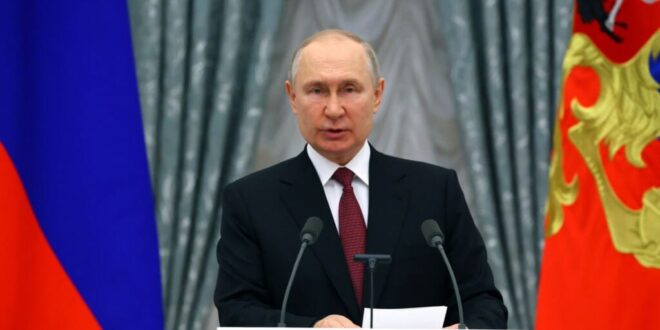Despite the world’s natural compassion for those who were killed on Friday, as a policy, the United States should resist the temptation to make common cause with Putinism against terrorism. Deals with Putin go one way—to hell.
Friday’s attack at a Moscow theater was an historic act of terrorism. It was the most grotesque slaughter of human life in Russia since the high point of Chechen terrorist violence in 2004. It exposed the weakness of Putin’s intelligence state while illuminating a gaping vulnerability: his shattered compact with the Russian people.
Twenty-four years ago, Putin convinced the Russian people that the collapse of Communism introduced them to a freedom that was too dangerous. “Give up your freedom to me,” he promised, “and I will use my power to keep Russia safe.” Now, in the twilight of his rule, he still grasps the power, but he is delivering neither safety nor stability.
Putin rides the bear while Moscow burns and terrorists mow down the Russian people. Don’t let the beautiful French bread at the grocery store fool you—chaos is all their pact with Putin is buying them now.
Putin loves a history lesson, so study up. This former head of the FSB launched his initial rise to the presidency by exploiting fear and terror. In 1999, he deftly rode a wave of “terrorist” bombings across Moscow (and elsewhere) to maneuver Boris Yeltsin from power. While Putin’s FSB almost certainly manufactured this bomb scare, the ensuing panic empowered him to lead a second invasion of Chechnya, rally his country around the flag, and offer a grand political bargain to Russia’s voters.
If Russians would relinquish their say in how Putin governed their country, give up their free press, and abandon all protests, he would consolidate power, vanquish the pervasive violent instability, and make them a prosperous country. In March 2000, Russian voters narrowly accepted his offer in a snap presidential election. The quarter century of Putinism we are all familiar with followed.
The initial establishment of Putin’s grand bargain was a killing field. Two years into his first term, Russian special forces botched the rescue of 800 hostages from Chechen terrorists in a Moscow theater—killing 129 innocents in the process. Two years later, Chechen terrorism crested in a series of attacks against Russian airliners, the Moscow Metro, and an elementary school. Undaunted, Putin’s security organs brutally squeezed Chechnya, assassinating dissidents, and coopting the surviving political class. Political violence eventually became sporadic and limited.
For the majority of Russians, a relative tranquility set in. Their freedom was gone. While the oligarchs got rich, their pile of rubles dwindled. Many still felt that the bargain was worth the exchange.
Putin, however, looked around for more power to seize. Thus came the expanded invasion of Ukraine in 2022. Initially framed as a short “special military operation,” Putin’s war for Ukraine metastasized into a grinding, bloody trench fight. The consequences are substantial. Russia remains under unprecedented international sanctions. Its currency is devalued. Food prices are in the stratosphere. And incompetence on the battlefield sparked last year’s short-lived mutiny and chaotic march on Moscow by Sergei Prigozhin—a mercenary warlord. No safety. No stability. No prosperity. No electoral change. That is Russian life today.
Last week’s sham presidential election in Russia was a humiliating exercise in voter supplication. Days later, terrorists set fire to a packed Moscow concert hall. The shocking killing of over 130 people recalled the darkest days of Putin’s early rule. The blazing inferno on Moscow’s skyline illuminates Russia’s worthless deal with him, and more violence is certain to come. How Putin responds will define the remainder of his rule.
Risibly, Putin opted to blame Ukraine. Both the United States and Ukraine threw cold water on his attempt. ISIS-K has since claimed credit for the attack. Significantly, the introduction of an outside terrorist group into the mix provides the Kremlin with the chance to run a familiar gambit.
Back in the 2000s, Putin made common cause with America’s global “war on terror.” He cynically claimed to be fighting a shared enemy. Moscow parlayed this pledge into a historic strategic alignment with the Bush and Obama Administrations—extracting bountiful concessions and treaty arrangements from the Americans as a result. Moscow may look to open similar avenues in the wake of this most recent attack.
Despite the world’s natural compassion for those who were killed on Friday, as a policy, the United States should resist the temptation to make common cause with Putinism against terrorism. Deals with Putin go one way—to hell.
Putin’s horrific war against Ukraine still rages. His soldiers’ war crimes go unpunished. Savage terrorism rips through Moscow. Do not give Putin a lifeline. Let the Russian people have a go at taking out their own dictator their way. Nicolae Ceausescu comes to mind, but that is a history lesson for the next class.
 Eurasia Press & News
Eurasia Press & News



